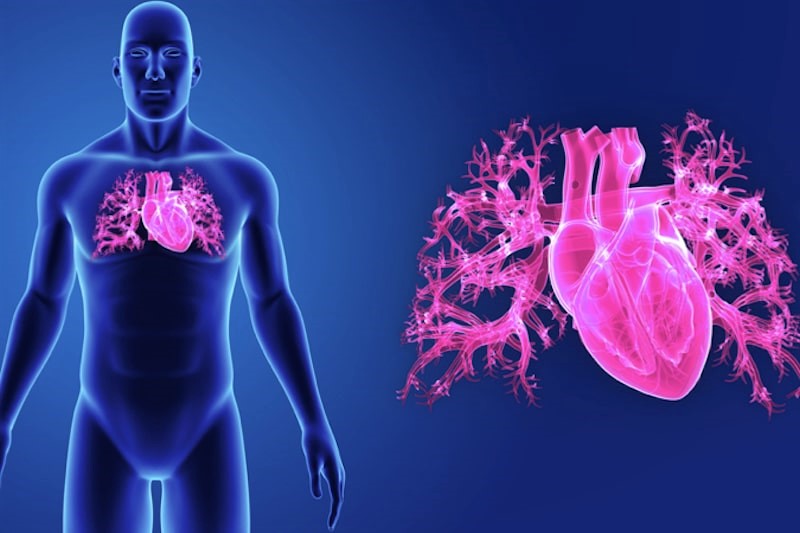
Inflammations of the heart: myocarditis
Myocarditis is an inflammation of the heart muscle that affects the middle layer of the heart wall, the muscular tonaca called the myocardium
The myocardium is formed by the heart muscle arranged in a spiral called the myocardial vortex
This causes the heart to contract with twisting movements, which causes increased blood ejection.
Myocardial inflammation can be ‘accompanied’ by bacterial, viral or fungal infections, exposure to toxins or drug therapies.
The heart, affected by infection, sees the muscle cells in its walls being damaged or even destroyed.
The immune system cells that are supposed to fight inflammation may end up damaging the heart itself.
The heart, unable to perform its pump function properly, will not be able to guarantee the correct blood supply to the organs as a consequence of thickening and weakening of the heart walls; symptoms of heart failure will then occur.
In some cases it heals completely, in others the heart failure may become chronic.
Myocarditis may present in a mild or severe form, most often tending to have a benign evolution.
It is usually asymptomatic and the damage it causes may emerge even years after myocardial damage, such as dilatation and cardiac dysfunction.
Myocarditis is the cause of death in about 20 % of sudden deaths among young people and athletes.
Symptoms of myocarditis
Symptoms vary in the type and severity of inflammation, and in some cases the symptoms are not obvious.
Generally, the symptoms of severe inflammation are arrhythmias, heart failure, cardiomyopathy, sudden cardiac arrest, and in the worst case, necrosis of the heart tissue may occur.
Usually, myocardial inflammation resolves without serious permanent consequences.
The milder forms are associated with viral infection and fever and exhaustion may occur.
In more severe cases that tend to become chronic, hospitalisation is required with appropriate treatment depending on the cause.
In these cases there will be cardiac arrhythmias, chest pain, shortness of breath, and loss of consciousness.
Myocarditis can be caused by: viral infections that invade the myocardium causing local inflammation; the immune system will be activated and will attack the cardiac myosin damaging the myocardium; alcoholic substances and heavy metals; antibiotic and chemotherapeutic therapies; autoimmune diseases where the heart will be attacked by the immune system; rejection following a heart transplant.
There are no preventive measures to prevent myocarditis; it is therefore necessary to treat bacterial and fungal infections immediately to prevent the heart and/or other organs from being involved.
Diagnosing myocarditis is not easy because of the underlying processes that cause inflammation and damage to the heart muscle.
Secondary causes, such as myocardial infarction, can cause inflammation of the myocardium itself, and therefore the diagnosis is based on confirmation of cardiac inflammation.
Tests that can be performed in order to have a diagnosis are:
blood tests to check for infection; chest X-ray, which can show signs of heart failure; electrocardiogram, which can detect abnormalities in heart rhythm or indicate cardiac distress; echocardiogram magnetic resonance imaging, which makes it possible to identify any inflammation of the heart tissue with its relative extent, size, cardiac function and the evolution of myocarditis over time; cardiac catheterisation; coronarography; endomyocardial biopsy, which consists of taking cardiac muscle tissue but is a test that is very rarely performed as it is an invasive procedure.
Prognosis and treatment of myocarditis vary depending on the cause and severity of the inflammation, the age of the patient
Infections can be managed with antibiotics, in other cases cardioprotective therapies are followed to regulate cardiac function, control blood pressure and arrhythmias, and prevent the formation of clots in the body.
In cases where there is severe heart dysfunction with decompensation that does not respond to conventional therapy, it will be necessary to apply devices that regularise the heartbeat, that help the heart pump, or in the most severe cases, cardiac transplantation.
Following the acute phase, it will be necessary to follow up with controls in order to monitor ventricular function as myocarditis may cause late damage.
Read Also
Emergency Live Even More…Live: Download The New Free App Of Your Newspaper For IOS And Android
Myocardiopathy: What Is It And How To Treat It?
Myocardial Infarction: Causes, Symptoms, Diagnosis And Treatment
Myocardial Infarction Symptoms: The Signs To Recognise A Heart Attack
Electrical Cardioversion: What It Is, When It Saves A Life
Heart Murmur: What Is It And What Are The Symptoms?
Performing The Cardiovascular Objective Examination: The Guide
Branch Block: The Causes And Consequences To Take Into Account
Cardiopulmonary Resuscitation Manoeuvres: Management Of The LUCAS Chest Compressor
Supraventricular Tachycardia: Definition, Diagnosis, Treatment, And Prognosis
Identifying Tachycardias: What It Is, What It Causes And How To Intervene On A Tachycardia
Myocardial Infarction: Causes, Symptoms, Diagnosis And Treatment
Semeiotics Of The Heart: History In The Complete Cardiac Physical Examination
Aortic Insufficiency: Causes, Symptoms, Diagnosis And Treatment Of Aortic Regurgitation
Congenital Heart Disease: What Is Aortic Bicuspidia?
Atrial Fibrillation: Definition, Causes, Symptoms, Diagnosis And Treatment
Ventricular Fibrillation Is One Of The Most Serious Cardiac Arrhythmias: Let’s Find Out About It
Atrial Flutter: Definition, Causes, Symptoms, Diagnosis And Treatment
What Is Echocolordoppler Of The Supra-Aortic Trunks (Carotids)?
What Is The Loop Recorder? Discovering Home Telemetry
Cardiac Holter, The Characteristics Of The 24-Hour Electrocardiogram
Peripheral Arteriopathy: Symptoms And Diagnosis
Endocavitary Electrophysiological Study: What Does This Examination Consist Of?
Cardiac Catheterisation, What Is This Examination?
Echo Doppler: What It Is And What It Is For
Transesophageal Echocardiogram: What Does It Consist Of?
Paediatric Echocardiogram: Definition And Use
Heart Diseases And Alarm Bells: Angina Pectoris
Fakes That Are Close To Our Hearts: Heart Disease And False Myths
Sleep Apnoea And Cardiovascular Disease: Correlation Between Sleep And Heart
Myocardiopathy: What Is It And How To Treat It?
Venous Thrombosis: From Symptoms To New Drugs
Cyanogenic Congenital Heart Disease: Transposition Of The Great Arteries
Heart Rate: What Is Bradycardia?
Consequences Of Chest Trauma: Focus On Cardiac Contusion


